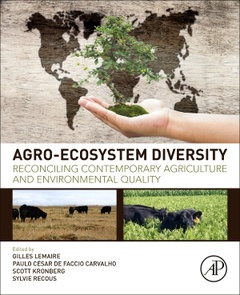Description
Agroecosystem Diversity
Reconciling Contemporary Agriculture and Environmental Quality
Coordinators: Lemaire Gilles, Carvalho Paulo Cesar de Faccio, Kronberg Scott, Recous Sylvie
Language: English
Subjects for Agroecosystem Diversity:
Keywords
Adaptation; Agricultural diversity; Agricultural intensification; Agricultural policy; Agricultural sustainability; Agricultural systems; Agrifood industry; Agri-food; Agroecology; Agroecosystem; Agroecosystems; Agroforestry; Agro-pastoralism; Alfalfa; Alternative agriculture; Biochemical cycling; Biodiversity loss; Biodiversity; Bio-economy; Biogeochemical feedback; Biologic nitrogen fixation; C; N and P Coupling; Cereals; Change; Climate change; Climate; C-N-P Coupling; Coevolution; Coexistence; Common agricultural policy; Community structure; Complementarity effect; Complementarity; Components; Composition; Conservation cropping; Conservation tillage; Cost-benefit analysis; Cover crop; Crop diversity; Crop rotation; Crop rotations; Crop-livestock integration; Crop-livestock systems; Crops; Dairy systems; Decision-making; Degradation; District level; Diversification; Diversity; Drivers; Ecological intensification; Economic impacts; Economic; Economy-ecology conflict; Ecosystem services; Ecosystems; Element Cycling; Environmental economics; Environmental impacts
478 p. · 19x23.3 cm · Paperback
Description
/li>Contents
/li>Biography
/li>Comment
/li>
Agro-Ecosystem Diversity: Impact on Food Security and Environmental Quality presents cutting-edge exploration of developing novel farming systems and introduces landscape ecology to agronomy. It encompasses the broad range of links between agricultural development and ecological impact and how to limit the potential negative results. Presented in seven sections, each focusing on a specific challenge to sustaining diversity, the book provides insights toward the argument that by re-introducing diversity, it should be possible to maintain a high level of productivity of agro-ecosystems while also maintaining and/or restoring a satisfactory level of environment quality and biodiversity.
1. C-N-P cycles in agro-ecosystems and impacts on environment 2. Increasing diversity within agro-ecosystem for reducing environmental emissions 3. Heterogeneity within and among agro-ecosystems and dynamics of biodiversity 4. Diversified agro-ecosystem at farm level for more sustainable agriculture production? 5. Socio-economic opportunities for and locking effects against diversification of agro-ecosystems 6. Diversification beyond the farm at landscape and regional level 7. Global aspects
Paulo holds a doctorate in Animal Science from Universidade Estadual Paulista Júlio de Mesquita Filho (UNESP). His thesis was carried out at INRA-FR and investigated diet selection by grazing animals. He is Professor Titular at the Faculty of Agronomy of UFRGS, since 1997. He was Visiting Scientist at FAO for the theme of integrated crop-livestock systems (ICLS), and Coordinator of the Animal Science Advisory Committee of the National Counsel of Technological and Scientific Development (CNPq), member of the Committee on Low Carbon Agriculture, of the Advisory Council of Alianza del Pastizal/BirdLife International. He is Vice-President of the Brazilian Society of Animal Production. He holds a level 1A research productivity grant from CNPq; leader of the Grazing Ecology Research Group. He is author of 180 peer-reviewed papers, 81 book chapters, and edited 8 books. His papers have 1370 citations on Web of Science and Scopus, H factor 15 e 16, respectively, and 2439 citations and h-index 25 on Google Scholar. He scores 36.69 on Research Gate. He was Guest Editor on 4 international journals. His research approach is focused on the management and functioning of pastoral ecosystems, and ICLS. He leads the Coordination of PISA Extension Program reaching ~1050 small stakeholders in Brazil, and currently coordinates the UFRGS Postgraduate Course in Animal Science.
Scott Kronberg has been conducting research on nutriti
- Demonstrates that diversified agro-ecosystems can be intensified with environmental quality preserved, restored and enhanced
- Includes analysis of economic constraints leading to specialization of farms and regions and the social locking forces resisting to diversification of agro-ecosystems
- Presents a global vision of world agriculture and the tradeoff between a necessary increase in food production and restoring environment quality




